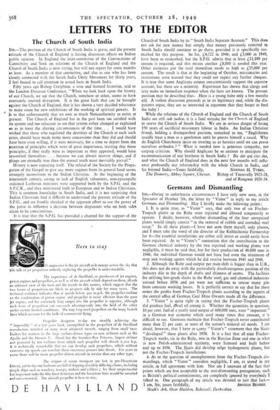Germans and Dismantling
Sta,—Owing to unfortUnate circumstances I have only now seen, in the Spectator of October 7th, the letter by " Viator " in reply to my article Germans and Dismantling. May I briefly make the following points: I. It is quite true, as " Viator " says, that only two of six Fischer- Tropsch plants in the Ruhr were repaired and allowed temporarily to operate. I doubt, however, whether dismantling of the four unrepaired plants would simply consist " in the removal of rubble and corroded steel scrap." In all these plants—I have not seen them myself, only photos, and I must take the word of the director of the Kohlechemie Partnership for it—the essential installations are either still intact or could easily have been repaired. As to " Viator's" contention that the contribution to the German chemical industry by the two repaired and working plants was negligible, it must be said that, but for their production of 48,000 tons in 1948, the individual German would not have had even the minimum of soap and washing agents which he did receive between 1945 and 1948.
2. Although the Ruhr coal output per man-shift is bigger than in U.K., this does not do away with the particularly disadvantageous position of the industry dire to the depth of shafts and thinness of seams. The facilities for utilising low-grade slacks in the Ruhr steel, gas and chemical industries existed before 1936 and yet were not sufficient to tescue many pits from constant working losses. It is perfectly correct to say that for these mines the profits from Fischer-Tropsch plants according to the reports of the central office of German Coal Mine Owners made all the difference.
3. " Viator " is quite right in saying that the Fischer-Tropsch plants did produce fuel, diesel oil among it. Whether the quantities in question, 10 per cent. fuel of a yearly total output of 600,000 tons, were " important " in a German ,war economy which used many times that amount, it is difficult to say. Germans maintain that Fischer-Tropsch never contributed more than 21 percent. at most of the nation's mineral oil needs. I am afraid, however, that I have to query " Viator's" statement that the Nazis "developed" these plants after 1938. It is a fact that all nine Fischer- Tropsch works, six in the Ruhr, two in the Russian Zone and one in what is now Polish-administered territory, were licensed and built before and up to 1938. The Nazis did develop other hydrogenetic plants, but not the Fischer-Tropsch installations.
4. As to the question of unemployment from the Fischer-Tropsch dis- mantlings, which " Viator " considers negligible, I am, as stated in my article, in full agreement with him. Nor am I unaware of the fact that points which arc less acceptable to the anti-dismantling protagonists, such as Britain's political commitments, are completely ignored by everybody I talked to. One paragraph of my article was devoted to just that fact.—
I am, Sir, yours faithfully, ARNOLD BENDER. Noah's Ark. Over Haddon, Bakcwell, Derbyshire.






































 Previous page
Previous page